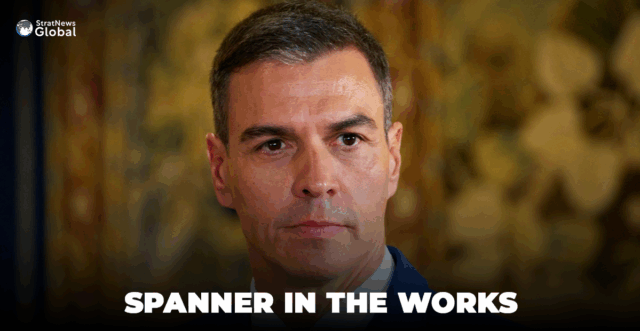Spain has formally sought exemption from NATO’s proposal to raise member states’ defence spending to 5% of their GDP — a request that could potentially throw a spanner in the works at an upcoming summit where the alliance is expected to press for unanimous commitment to the ambitious target.
In a letter sent to NATO chief Mark Rutte on Thursday and seen by Reuters, Prime Minister Pedro Sanchez requested a “more flexible formula” that either makes the spending target optional or excludes Spain from its application.
He said it was not Spain’s intention to obstruct the outcome of next week’s NATO summit. But any agreement to raise defence spending – a response to a request by US President Donald Trump – would require unanimous approval by the 32 member states.
‘Counterproductive’
“Committing to a 5% target would not only be unreasonable, but also counterproductive, as it would move Spain further away from optimal spending and would hinder the EU’s ongoing efforts to strengthen its security and defence ecosystem,” Sanchez wrote in the letter.
“It is the legitimate right of every government to decide whether or not they are willing to make those sacrifices. As a sovereign Ally, we choose not to,” he added.
At an estimated 1.28% of GDP, Spain had the lowest proportion of expenditure on defence in the alliance last year, according to NATO estimates. Sanchez agreed in April to accelerate efforts to meet NATO’s current target of 2%.
Ongoing Discussions
Rutte has proposed that member states agree to boost defence spending to 3.5% of GDP and commit a further 1.5% to broader security-related spending.
Leaders across NATO say its current spending goal is no longer sufficient, with Russia posing a greater threat since its 2022 invasion of Ukraine.
Asked for comment on Spain’s request, a NATO official said: “Discussions among Allies on a new defence investment plan are ongoing.”
Spain’s Concerns
The US, which has been Kyiv’s primary military backer since Russia’s invasion, spent an estimated 3.38% of GDP on defence in 2024, the third-most among NATO nations, according to the alliance.
Trump has said NATO members are not spending their fair share on defence and has threatened not to come to the aid of those falling short.
Sanchez, however, said that rushing to a 5% target would harm European Union efforts to become self-reliant in defence production, pushing governments to procure equipment outside the bloc and that it was “incompatible with our welfare state and our world vision”.
Junior coalition partners, the far-left Sumar platform, oppose any increase, as does the Podemos party, which is not part of the coalition but has supported the government in key votes.
Now, a corruption scandal engulfing the prime minister’s Socialist party has generated fury among coalition partners and allies, even raising the spectre of an early election.
“If the government needs parliamentary support to approve spending, it will have a very difficult time in the current situation,” Jose Miguel Calvillo, a professor of international relations at the Complutense University of Madrid.
Timeline Questioned
Some other NATO members have also questioned the timeline, saying it is too rapid, but are generally willing to sign up, diplomatic sources say.
Italy, for example, wants the deadline moved to 2035 from 2032 and the removal of a requirement to increase spending by 0.2% per year, a source with knowledge of the matter said.
“It doesn’t look good, indeed, but we are not over yet,” said one senior European official in relation to Sanchez’s letter. “We will have in-depth discussions tomorrow, and perhaps we find a way out. Spain has demonstrated to be a steadfast ally so far.”
(With inputs from Reuters)





